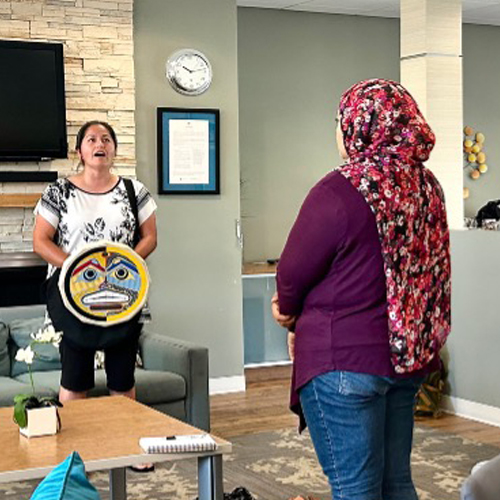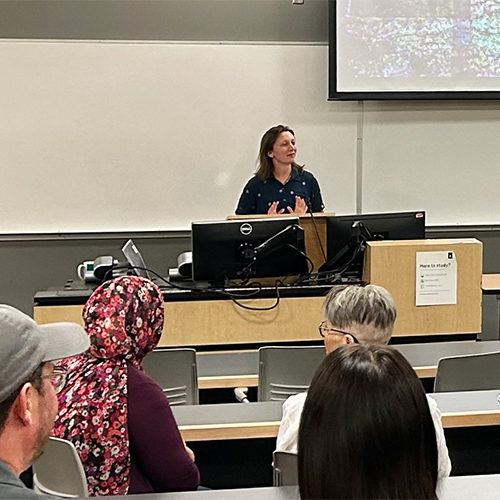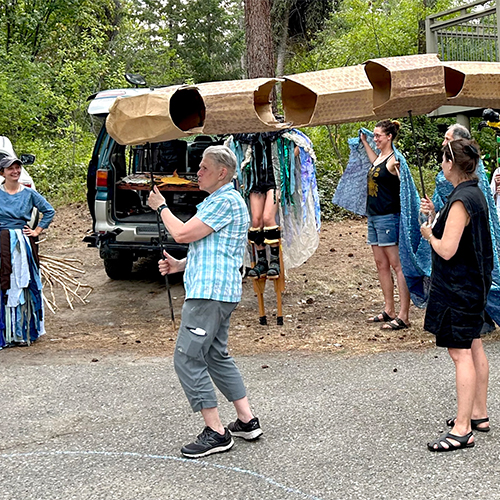
By Kitty Blandy, Vancouver-based visual artist and SFU liberal studies masters candidate, who focuses on being and the human/animal/body.
As I walk from the airport through a semi-industrial neighbourhood to the University campus, a Chattering ‘gulp’ of five tree swallows catch my attention. This unexpected interspecies communication strikes me as an appropriate welcome, warning or solicitation to the symposium’s offerings.

Local and planetary agenda-setting
Dr. Jodey Castricano, Associate Dean, Research and Graduate Studies at UBC Okanagan, explains we are here to “consider what Timothy Moreton has called the net effect: mass extinction, planetary injustice and the logical consequences of exploitative and insidious human practices”. While Dr. Bryce Traister, Dean of the Faculty of Creative and Critical Studies, reminds us of the importance of storytelling as a conceptual framework.
The aim of the gathering is for the Arts/Humanities to have a seat at the table in, ‘local and planetary agenda-setting’, and to explore them as a method for creating awareness, “at the crossroads of sustainability and what we imagine,” says Castricano, “as multi species storytelling that is no longer limited to anthropocentrism.”
Judiciously, story-teller Anona Kampe of the Syilx Okanagan Nation sets the tone for the symposium with a tale that culminates in the Sylix speaking peoples’ three protocols: only take what you need, use what you take and give back in reciprocity.
How to live sustainably in an age of mass extinction?
Tracing the roots of overconsumption, Dr. Paul Young, Associate Professor of Victorian Literature and Culture, University of Exeter, presents, Carnivorous Crusoes: Victorian Adventure Fiction, Globalized Food Security + Settler Violence; describing how the 50% increase in meat eating in Britain between the end of the 19th century to WWI, due to new preservation methods, created a ‘dead meat trade’. His research reveals how the popularity of Victorian adventure fiction, “fundamentally changed the planet”, informing how people think of food systems to this day.
In Something Wicked This Way Comes: Animal Agriculture + The Anthropocene, Castricano borrows the phrase from the Scottish play to refer to the “Wicked” problem of climate change. Quoting Amitav Ghosh, Castricano points to “modes of concealment of the real”, that stories are not being told, and the “something wicked” has arrived. She acknowledges that people have prediction fatigue and describes how we live in a “post doom” world where, “extinction level tipping points are in the rear-view mirror”.
Holly Cecil, filmmaker at the University of Victoria, reminds us, in her Cooking the Planet: Communicating the climate Diet Imperative, that climate change warnings began back in 1956, and yet 98% of climate change stories still do not mention meat.
Gay Penguins and Happy Endlings: Sex and Nature with Comedy, Against Slow Violence, is a provocative paper offered by Dr. Ina Linge, Senior Lecturer in German, University of Exeter. Hope and doom, says Linge, are two sides of the same coin – and in this vein comedy is an “affective engagement”. This method of storytelling allows for humour to “disrupt social hierarchies” and fosters “new ways of living”.
Other key presentations
- Zach Dewitt, English masters candidate UBC Okanagan: “Animacy and Nature in Eden Robinson’s Monkey Beach”.
- Britt Mackenzie-Dale, Creative Writing Masters candidate University of New Brunswick: “Writing with Animals: Using Fiction to Explore Entangled Exploitations within Animal Agriculture”
- Ramey Newell, film maker and lecturer UBC Okanagan, “Reimagining Possibility Space: Image-making in the Anthropocene”.
- Nicola Harwood writer/artist, Creative Writing and Interdisciplinary Expressive Arts at Kwantlen Polytechnic University: “Can We Talk? Mountain Caribou and the Wolf Cull in Southeastern BC. A Project in Communication”.
- Avantika Mather, University of Saskatchewan: “My Breadcrumb Trail to Animal Communication”.
- Annie Furman, masters candidate UBC Okanagan: “That Sounds Fishy: Nourishing Narrative in Performance-Based Environmental Education”.
- Tara Nicholson, PhD candidate UBC Okanagan: “Ecozombies and Arctic Extinctions”.


Stories as fuel for action
Day two – the workshop at Woodhaven Eco Culture Centre – hot dry air and the sweet smell of parched pine. Anona Kampe captivates us again with a Syilx creation story, introducing us to the four food chiefs of the Okanagan: Black Bear, Saskatoon Berry, Bitterroot and Salmon. The day is full with spoken word, films, poetry readings, discussions, and river-listening, including: Ronan Fraser, masters candidate UBCO's Coming from Further than Far Away; Dr Sharon Thesen, Professor Emerita, Creative Studies and Creative Writing UBC Okanagan reading from Oyama Pink Shale, and an inclusive participatory Festival of Riparian Puppets headed by Madi Donald and Annie Furman from UBC Okanagan.
The take away: stories can fuel initiative, bringing emotion and logic to a place of motivation. As Castricano concludes, “stories serve to naturalize certain ways of thinking about and acting in the world because they can invite and inspire meaningful social and cultural engagement and action.”
Photos courtesy of the Faculty of Creative and Critical Studies, UBC Okanagan.